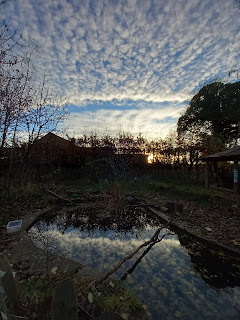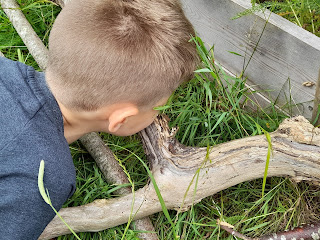What do the Children want?
The children and I have been trying to put together a 'podcast'. This will inevitably end up more of a soundtrack to accompany photos of Forest School, but the chatting part of it has been recorded in the school radio room and I've aimed to step back and let different children voice their opinions.
This isn't easy. Children can be shy, can struggle to explain themselves, and love to go off at a tangent when talking! Often I have had to ask a question to encourage the end of a long pause or interpret a facial expression or a shrug!
The one thing I haven't had to do is prompt, maneuver, or insist they talk about Forest School.
Each child has been enthusiastic, some stammering in desperation to get their
point across, some quiet and considered, but all those involved have had valid observations and thoughts on what sessions mean to them.
I make it clear they can tell the recording what they like or dislike, they can include any small groups we have branched off into to cover gardening and planting, Eco Committee, and the Wildlife Club, and can include any information they feel is relevant.
I don't know why it always surprises me when they remember snippets of information told just once, maybe a few years ago, but they do.
They tell me they like the colour of the rose hips, or the area under the pine trees, or think that a Blue Tit is their favourite bird.
They remember that time we saw the lizard, or how many newts we've pond dipped, or when it rained so hard last summer we were all wet through to the skin.
They know that litter endangers the wildlife and the planet, they want us to plant trees and flowers for the birds and bees, and they wish they could make what they consider to be obvious choices, like having solar power, lots of recycling, and for their views on being outdoors to be listened to.
I say I don't know why it always surprises me because these are all the reasons I take them outside in the first place!
It's why we have a basecamp that is a reference 'library' of books, guides, equipment, and objects to help identify pretty much anything they come across. It's why we discuss what they want to do, and why I give them the opportunity to write or draw their ideas. It's why they seek me out to ask questions, both at Forest School and in the school corridors, and why - even if I have to google it - I'll always do all I can to provide an answer!
We appreciate and celebrate the knowledge children bring to Forest School with them. Some are scouts and guides and like to lead den-making and knot-tying, some live on farms and meet wildlife regularly, some feed the birds in their garden, or have family that rescue hedgehogs, or have lived outside of England and have tales of wildlife that seems a lot wilder than we are used to! We listen to these stories, draw on their experiences, support, and share that knowledge.
Once we sat down in a studio with a focus on Forest School and being outside it threw up lots of different things. Children who enjoy a peaceful space. Those who like to look for small details. Those who love unstructured time with their friends. Aspects of childhood there is little time for within the curriculum.
Some children spoke of an interest in birds or gardening, one or two brought this to school with them, and have feeding stations at home, or help a relative on an allotment. What was very telling was those who have discovered that they like to plant things or recognise birds and have no other outlet for exploring that interest. If school doesn't supply some form of outdoor learning, where do these children get to develop their interests?
I've only chatted with years 3, 4, and 5 so far, with an age range of 7 - 10 years old, and all of them want more time outside, more gardening, more nature, more wildlife...
We can all see the benefits of increasing outdoor learning. We can also see the links with the curriculum. But few schools invest time or money into developing this. In all honesty, time and money are something schools have little of. Even though we know that actually, it could cost very little, it could make the curriculum easier to teach, and it could make your school more appealing and more successful. Staffing and training budgets are shrinking, space may be lacking, and the act of changing the way things are done isn't always embraced.
There are demands from The Department of Education, and there are targets to be met, focusing on where we have to get to rather than how we get there is a trap many fall into. It's also easier to sign up to projects and schemes that are tried and tested, that claim to make teaching easier, the curriculum richer, and learning more effective. After 30 years in education I've lost count of how many of these have come and gone.
What I hear from the children doesn't just reinforce all the studies that show that outdoor learning is good for children and produces better results, but that it's what they want. Without knowing about these studies, children are asking for more time outdoors. Not at leisure, but exploring and investigating, growing and planting, and using the space around them to learn in.
I suggested to one child that we have a big nature table in school, and his eyes lit up, 'that would be great!', then he frowned, 'as well as Forest School because I like being outside in the fresh air'.
Usually, when I talk to children about the best bits of Forest School, I hear a lot about hot chocolate and s'mores! But they are taking this podcast seriously. They are chatty, and giggly, and earnest in their advocacy of the environment, nature, wildlife, and their place in it.
It's going to take a while to complete. For every 3 minutes of chat there's about 30 minutes of editing!
But what they have to say is a voice often unheard.
And I'd like to alter that a little, even if it's only for one school.






Comments
Post a Comment